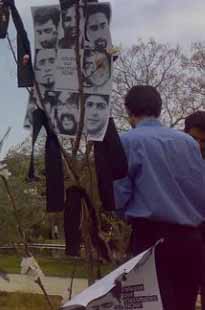| Home > 30 years human rights in Iran > Articles of the Universal Decleration of Human Rights > Freedom and Security: The Right of Every Human Being, Anywhere | |||
Freedom and Security: The Right of Every Human Being, AnywhereBy Mohammad OliyaifarMohammad Oliyaifar is a lawyer at the Ministry of Justice and a civil rights activist in Iran. [How is that possible? editor.] He is the head of the Center for Legal Studies, concentrating [does the center concentrate in discrepancies or does he? And where is the Center for Legal Studies, is it affiliated with some other organization? editor] in discrepancies between International law and current Iranian law. He discusses Article 3 of the International Human Rights Charter. Article 3 of the International Human Rights Charter states that every individual has the right to life, freedom and security. My interpretation is that the right to life, freedom and personal security are among the most self-evident rights an individual has in society. Therefore, in a democratic society, the right to life, freedom and personal security must be guaranteed by law to every individual. Therefore, countries which, with their own special ideology, which can be any ideology, restrict or deny the right to life, freedom or personal security are acting in conflict with Article 3 of the International Human Rights Charter, as well as (in violation of) international accords. It can be argued that if such laws are passed and implemented, they are a violation of fundamental human rights. With respect to the right to life, we may ask governments that do not accept the annulment of executions, in view of the social contracts to which they are a party and intend to implement as a legal order, whether they have the power to deny life to a human being? This can be set as the criterion (mesdagh) for execution. (If the above paragraph is not clear, it is because the original Persian is not clear to me – translator.) [Yes, I don't get it either! editor.] However, with respect to freedom, it includes the freedom of speech, freedom to express an opinion, and freedom in art. So long as this freedom does not infringe upon other people's rights, one can view it as positive and use it to one's benefit. (The writer or speaker says "freedom of opinion". Obviously anyone has freedom to have an opinion, as long as this opinion is not expressed. Iranians, in general, are not careful with words. Furthermore, I have never heard of "freedom in art," even in the West, where certain lyrics in music are being banned – translator) The only red line in freedom is not infringing upon the rights of another individual. Therefore, freedom of speech, freedom to express an opinion, freedom in art, freedom to choose one's employment, etcetera, can be among the criteria of the article in this charter. Not sure I understand highlighted. The same applies to personal security. That is, based on his or her circumstances in society, an individual has the right to personal security, including security of employment, security of dignity, and the security which the law has provided for him or her. (I would like the author to define "freedom". In the freest society, what does it mean to be free? Can one be totally free? And what is the "security of dignity," heysiat? – translator) [Yes, a weak piece all around. ed.] Therefore, though this article [in the charter] is very short, it is full of meaning, with the potential for vast interpretation. It can be argued that this article is one of the main pillars of a democratic society. Therefore, societies where people deprive individuals of freedom and personal security can be called totalitarian. Such societies are not only unable to bring about progress, but they deprive their people of the most self-evident human rights. Unfortunately, in the Islamic Republic, such restrictions exist. Most laws in the Islamic Republic violate Article 3 of the International Human Rights Charter. |
|||
 |












